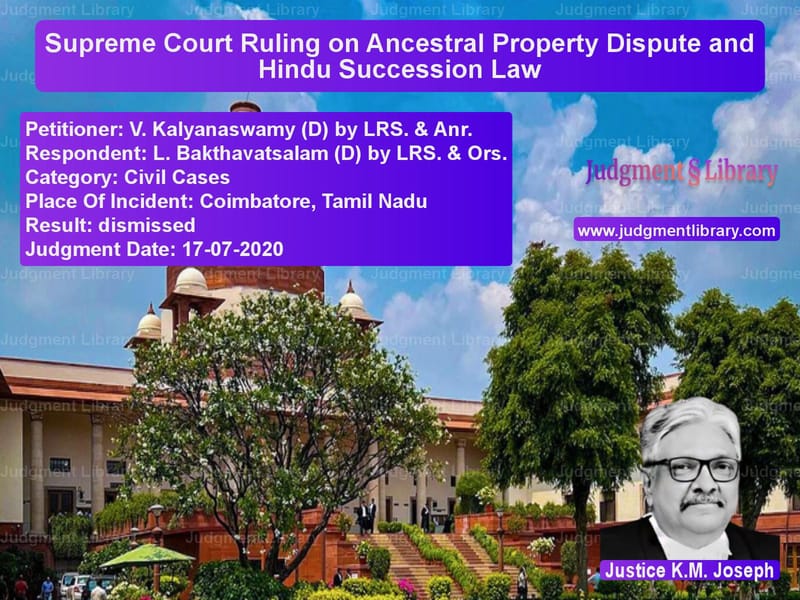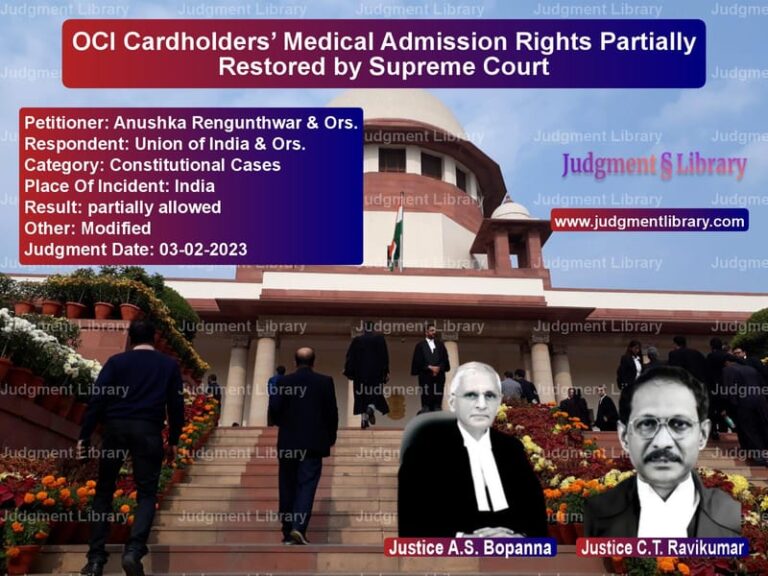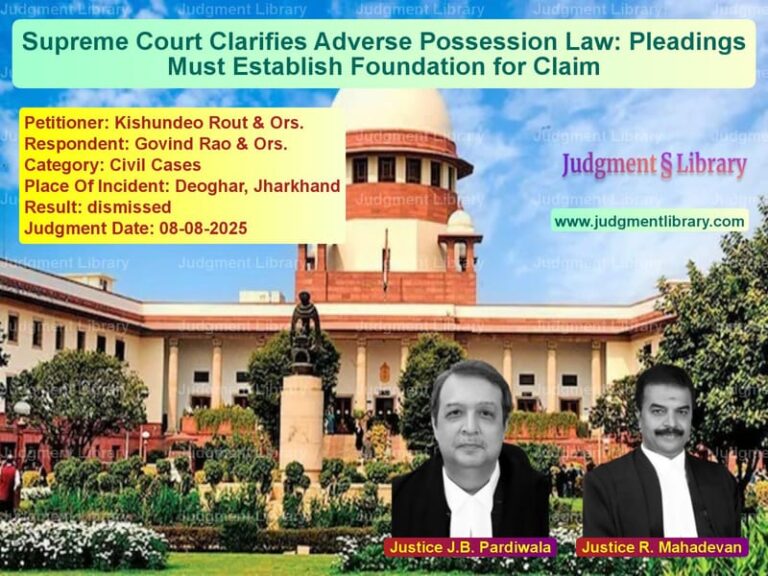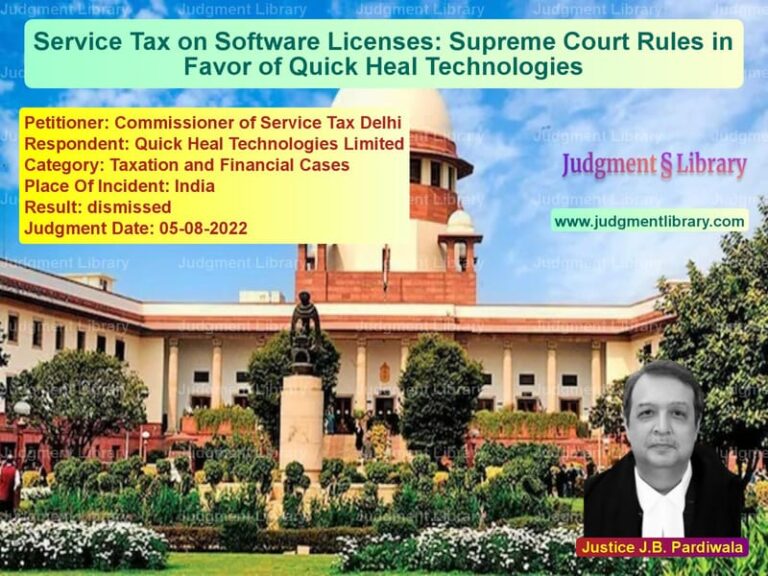Supreme Court Ruling on Ancestral Property Dispute and Hindu Succession Law
The Supreme Court of India delivered a significant ruling in the case of V. Kalyanaswamy (D) by LRS. & Anr. vs. L. Bakthavatsalam (D) by LRS. & Ors., dealing with crucial legal questions regarding ancestral property, partition, and the applicability of the Hindu Succession Act. The judgment provides clarity on the rights of coparceners, the validity of testamentary disposition, and the legal principles surrounding joint Hindu family property.
The dispute centered on properties originally belonging to a joint Hindu family, and the key issues were whether the properties remained undivided, whether a partition had occurred in 1932, and the validity of a 1955 will executed by Rangaswami Naidu. The Supreme Court, after a detailed examination of the facts and legal principles, dismissed the appeal and restored the trial court’s judgment in favor of the respondents.
Background of the Case
The legal battle began when the petitioners, representing the heirs of Rangaswami Naidu, claimed exclusive ownership of certain properties based on a partition allegedly executed in 1932 and a will executed in 1955. The respondents, representing the heirs of Lakshmiah Naidu, disputed these claims, arguing that the properties continued to remain part of the joint Hindu family estate and that the alleged will was invalid.
Key legal questions before the Court included:
- Whether there was a valid partition of the joint family properties in 1932.
- Whether the will executed in 1955 by Rangaswami Naidu was legally enforceable.
- The applicability of the Hindu Succession Act, 1956, particularly Section 14(1), in determining the rights of the widow, Krishnammal.
Arguments of the Petitioner
The petitioners, led by V. Kalyanaswamy, presented the following arguments:
- A valid partition took place in 1932, which divided the joint family properties between the two brothers, Rangaswami Naidu and Lakshmiah Naidu.
- Rangaswami Naidu executed a valid will in 1955, transferring his share of the properties to his wife and other beneficiaries.
- The first appellate court correctly held that the declaration of separation was sufficient to effectuate a division.
- The trial court erred in invalidating the will, as it failed to appreciate the intention of the testator.
Arguments of the Respondent
The respondents, representing the heirs of Lakshmiah Naidu, countered the claims by asserting:
- No valid partition had taken place in 1932, meaning that the properties remained joint Hindu family properties.
- The will was not executed under sound disposing capacity and was surrounded by suspicious circumstances.
- The Hindu Succession Act, 1956, particularly Section 14(1), applied, making the widow, Krishnammal, the absolute owner of the properties.
- The first appellate court erred in reversing the trial court’s findings and wrongly relied on secondary evidence.
Key Observations of the Supreme Court
The Supreme Court analyzed the legal principles governing Hindu coparcenary property and the requirements for proving testamentary disposition. The key findings were:
1. Absence of Proof of Partition
The Court noted that no documentary evidence was provided to substantiate the claim that a partition had occurred in 1932. The Court held:
“A mere assertion of partition without corroborative evidence cannot be relied upon to claim exclusive ownership over ancestral properties.”
2. Public Notice and Its Legal Effect
The appellants contended that a public notice issued in 1955 was sufficient to effectuate severance of joint family status. The Supreme Court, however, observed:
“A public notice by itself does not amount to partition unless supported by unequivocal acts of separation such as division of properties by metes and bounds.”
3. Invalidity of the Will
The validity of the 1955 will was contested by the respondents, who alleged suspicious circumstances surrounding its execution. The Court held:
“For a will to be legally enforceable, compliance with Sections 68 and 69 of the Evidence Act is necessary. The absence of a credible attesting witness raises serious doubts about its validity.”
4. Application of Section 14(1) of the Hindu Succession Act
One of the most critical aspects of the case was the rights of Krishnammal, the widow of Rangaswami Naidu. The Court ruled that under Section 14(1) of the Hindu Succession Act, she became the absolute owner of the properties, stating:
“The legislative intent behind Section 14(1) is to eliminate the subordinate position of Hindu widows by vesting them with full ownership rights over property possessed by them.”
Final Verdict
The Supreme Court dismissed the appeals, restoring the trial court’s judgment. The Court ruled:
“The findings of the trial court are based on sound legal principles and do not warrant interference. The appeal is accordingly dismissed.”
Key Takeaways from the Judgment
- Partition claims must be backed by concrete evidence and cannot be based on mere assertions.
- A public notice alone does not effectuate severance of joint family status unless followed by an actual division of assets.
- The validity of a will must be established through compliance with evidentiary rules.
- Under Section 14(1) of the Hindu Succession Act, a widow becomes the absolute owner of property possessed by her at the time of succession.
Conclusion
This landmark ruling reinforces key principles of Hindu succession law and property rights. The Supreme Court’s judgment ensures that coparcenary rights are protected while emphasizing the need for adherence to legal requirements in testamentary succession. The decision serves as a guiding precedent for future disputes involving ancestral property and succession laws in India.
Petitioner Name: V. Kalyanaswamy (D) by LRS. & Anr..Respondent Name: L. Bakthavatsalam (D) by LRS. & Ors..Judgment By: Justice K.M. Joseph.Place Of Incident: Coimbatore, Tamil Nadu.Judgment Date: 17-07-2020.
Don’t miss out on the full details! Download the complete judgment in PDF format below and gain valuable insights instantly!
Download Judgment: V. Kalyanaswamy (D) vs L. Bakthavatsalam (D Supreme Court of India Judgment Dated 17-07-2020.pdf
Direct Downlaod Judgment: Direct downlaod this Judgment
See all petitions in Property Disputes
See all petitions in Succession and Wills
See all petitions in Landlord-Tenant Disputes
See all petitions in Judgment by K.M. Joseph
See all petitions in dismissed
See all petitions in supreme court of India judgments July 2020
See all petitions in 2020 judgments
See all posts in Civil Cases Category
See all allowed petitions in Civil Cases Category
See all Dismissed petitions in Civil Cases Category
See all partially allowed petitions in Civil Cases Category







